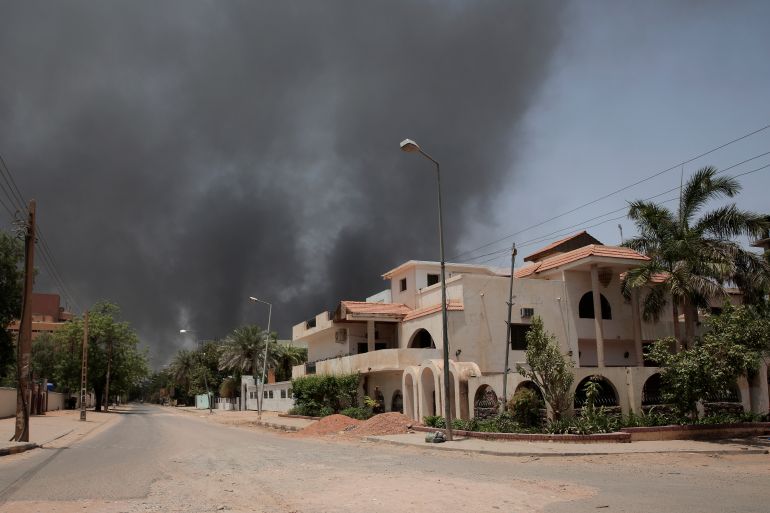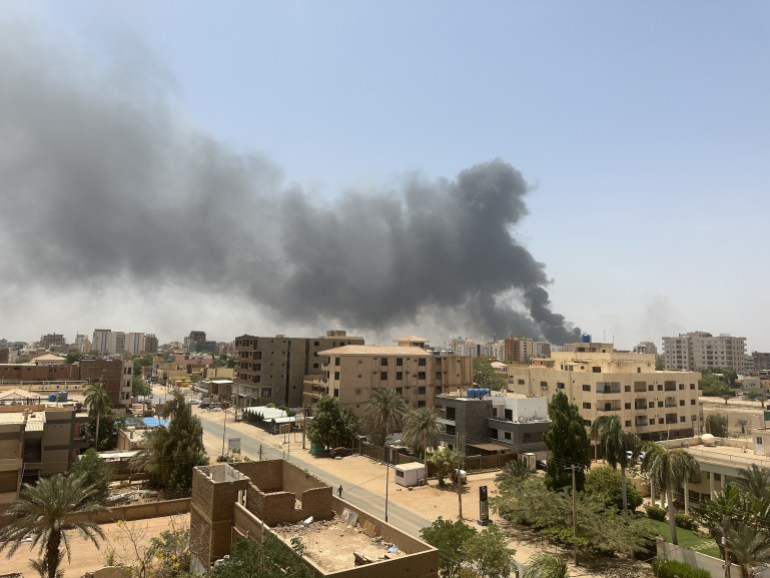Fighting in Sudan: What we know so far
Fighting between the army and a paramilitary force rages for a second day as the international community calls for a ceasefire.

At least 56 civilians have been killed and 595 people, including combatants, have been wounded in fierce fighting between the Sudanese army and the paramilitary Rapid Support Forces (RSF), the Sudanese Doctors Union says as the violence entered its second day in the capital, Khartoum.
Al Jazeera’s live television feed showed clouds of smoke billowing over Khartoum’s skyline on Sunday. Witnesses told Al Jazeera that fighter jets were visible in the skies over the city, seemingly targeting RSF locations in air raids. The Reuters news agency reported that heavy artillery was fired across the capital and surrounding areas and fighter.
Keep reading
list of 3 itemsWorld powers condemn violence as clashes erupt in Sudan
Sudan death toll rises to 56 as fierce fighting rages in Khartoum
What has happened so far?
“We can hear shots being fired. We can hear heavy artillery being fired,” Al Jazeera’s Hiba Morgan reported from Khartoum after the fighting broke out on Saturday. “It’s not clear who is in control of the [Presidential] Palace, and there are battles over the state television.”
“Fighter jets were witnessed in several districts, seeming to target RSF locations using air strikes,” she said. “We can see plumes of smoke where those strikes have been carried out.”
Saturday saw fighting in the capital and other parts of the country as the army struck a base belonging to the RSF in the city of Omdurman, outside Khartoum, witnesses told Reuters.
The sound of heavy fire was audible across the capital with reports of fighters from both sides engaging their weapons from armoured vehicles and machine guns mounted on pick-up trucks in densely populated areas.

The RSF claimed to have seized the presidential palace, army chief’s residence, state television station and airports in Khartoum, the northern city of Merowe, El Fasher and West Darfur state. The army rejected those assertions.
The air force told people to stay indoors while it conducted what it called an aerial survey of RSF activity, and a holiday was declared in Khartoum state on Sunday, closing schools, banks and government offices.
Why is there fighting in Sudan?
The battles follow rising tensions over the proposed integration of the RSF into the military. The disagreement has delayed the signing of an internationally backed agreement with political parties on a transition to democracy.
A coalition of civilian groups that signed a draft of that agreement in December called on Saturday for an immediate halt to hostilities to stop Sudan from sliding towards “total collapse”.
The RSF was created in 2013 by then-President Omar al-Bashir, who was ousted after months of pro-democracy protests in 2019. A transition government dominated by civilians was overthrown by the military in 2021 with the cooperation of the RSF.
Tensions between the military and RSF have escalated since then as the two groups have competed for legitimacy and control of the country.
In recent months, these tensions were exacerbated by a deterioration in relations between General Abdel Fattah al-Burhan, commander of Sudan’s military, and General Mohamed Hamdan Dagalo, head of the RSF.
The disagreement stemmed from disagreements about how the RSF should be integrated into the armed forces and what authority should oversee the process. The merger is a key condition of Sudan’s unsigned transition agreement with political groups.
Where is the fighting taking place?
Fighting has been reported across Khartoum with especially heavy clashes reported around the Presidential Palace, state television buildings and Khartoum International Airport.
Fighting has also been reported in Omdurman, northwest of Khartoum, and the city of Bahri, north of the capital.
There was also gunfire heard in the Red Sea city of Port Sudan, where there had been no earlier reports of fighting.
Three employees of the World Food Programme were killed in a crossfire at a military base in Kabkabiya in western Sudan.
What has the international response been?
The international community has strongly condemned the violence.
The United States, China, Russia, Egypt, Qatar, Saudi Arabia, the United Arab Emirates, United Nations, European Union and African Union have all called for an end to the hostilities.
US Secretary of State Antony Blinken said the situation in Sudan was “fragile” but insisted there was still an opportunity to complete a transition to a civilian-led government.
Fighting between SAF and RSF forces threatens the security and safety of Sudanese civilians and undermines efforts to restore Sudan’s democratic transition. The only way forward is to return to negotiations.
— Secretary Antony Blinken (@SecBlinken) April 16, 2023
The US ambassador to Sudan, John Godfrey, wrote on Twitter on Sunday that he had taken shelter with his embassy staff.
“Escalation of tensions within the military component to direct fighting is extremely dangerous,” Godfrey wrote. “I urgently call on senior military leaders to stop the fighting.”
China also expressed concern with its Ministry of Foreign Affairs urging both sides to pursue a ceasefire and prevent further escalation.
UN Secretary General Antonio Guterres condemned the outbreak of fighting and called for calm.
“The Secretary-General calls on the leaders of the Rapid Support Forces and the Sudanese Armed Forces to immediately cease hostilities, restore calm and initiate a dialogue to resolve the current crisis,” said Stephane Dujarric, Guterres’s spokesman.